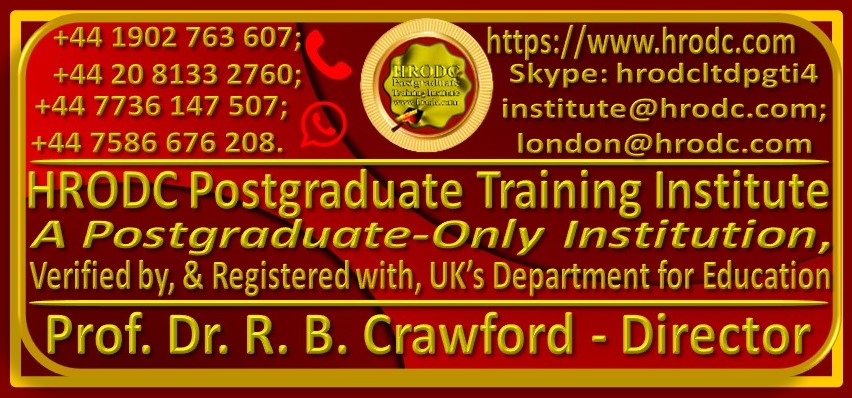|
Bank Cost and Budgetary Control, PG Course. |
|
 |
|
|
|
|
Seminar or Course Number 088 -
Bank Cost and Budgetary Control Course, Leading to
Diploma – Postgraduate – in Bank Cost and Budgetary
Control, Double-Credit, accumulating to a Postgraduate
Certificate, with 120 additional Credit-Hours, and a
Postgraduate Diploma, with 300 additional Credit-Hours.
Click to download the PDF Brochure for this Course
Doctor of Philosophy {(PhD) {University College London (UCL)
- University of London)};
MEd Management (University of Bath);
Postgraduate (Advanced) Diploma Science Teacher Ed.
(University of Bristol);
Postgraduate Certificate in Information Systems
(University of West London, formerly Thames Valley University);
Diploma in Doctoral Research Supervision, (University of
Wolverhampton);
Teaching Certificate;
Fellow of the Institute of Management Specialists;
Human Resources Specialist, of the Institute of
Management Specialists;
Member of the Asian Academy of Management (MAAM);
Member of the International Society of Gesture Studies (MISGS);
Member of the Standing Council for Organisational
Symbolism (MSCOS);
Member of ResearchGate;
Executive Member of Academy of Management (AOM). There,
his contribution incorporates the judging of competitions, review of
journal articles, and guiding the development of conference papers. He
also contributes to the Disciplines of:
Human Resources;
Organization and Management Theory;
Organization Development and Change;
Research Methods;
Conflict Management;
Organizational Behavior;
Management Consulting;
Gender & Diversity in Organizations; and
Critical Management Studies.
Professor Dr. Crawford has been an Academic in the
following UK Universities:
University of London (Royal Holloway), as Research Tutor;
University of Greenwich (Business School), as Senior
Lecturer (Associate Professor), in Organisational Behaviour and Human
Resource Management;
University of Wolverhampton, (Wolverhampton Business
School), as Senior Lecturer (Associate Professor), in Organisational
Behaviour and Human Resource Management;
London Southbank University (Business School), as
Lecturer and Unit Leader.
His responsibilities in these roles included:
Doctoral Research Supervisor;
Admissions Tutor;
Postgraduate and Undergraduate Dissertation Supervisor;
Programme Leader;
Personal Tutor.
He was formerly an Expatriate at:
Ministry of Education, Sokoto,
Nigeria;
Ministry of Science and
Technical Education, Sokoto, Nigeria;
University of Sokoto, Nigeria;
College of Education, Sokoto,
Nigeria; and
Former Editor-In-Chief of ‘Sokoto Journal of Education’.
For Whom This Course is Designed
This Course is Designed For:
-
Managers
with direct financial responsibilities;
-
Cost and management accountant;
-
Financial planners and cost analysts;
-
Senior managers who supervise people with financial
responsibilities;
-
Financial and budget controllers who are moving to wider
responsibilities;
-
Managers who need to know more about business planning,
budgeting, costing terms and techniques;
-
Managers who have to plan, cost and budget new business
ventures;
-
Managers and Supervisors from every business discipline and
department who have to run departments and plan, cost and budget
during their business lives;
-
First appointment managers on fast-track development Programmes;
-
Managers who require a refresher programme on the topic or who
would benefit from having an opportunity to consider new ideas
and methods.

The course cost does not include living accommodation. However,
delegates are treated with the following:
-
Free Continuous snacks throughout the Event Days;
-
Free Hot Lunch on Event Days;
-
Free City Tour;
-
Free Stationery;
-
Free On-site Internet Access;
-
HRODC Postgraduate Training Institute’s Diploma –
Postgraduate; or
-
Certificate of Attendance and Participation – if unsuccessful on
resit.
HRODC Postgraduate Training Institute’s Complimentary Products
include:
-
HRODC Postgraduate Training Institute’s
Leather Conference
Folder;
-
HRODC Postgraduate Training Institute’s
Leather Conference
Ring Binder/ Writing Pad;
-
HRODC Postgraduate Training Institute’s
Key Ring/ Chain;
-
HRODC Postgraduate Training Institute’s
Leather Conference
(Computer – Phone) Bag – Black or Brown;
-
HRODC Postgraduate Training Institute’s
8GB USB Flash Memory
Drive, with Course/ Programme Material;
-
HRODC Postgraduate Training Institute’s
Metal Pen;
-
HRODC Postgraduate Training Institute’s
Polo Shirt.
Location: Central
London and International Locations
Daily Schedule:
9:30 to
4:30 pm.
Methodology to be Employed
For the proposed workshop a variety of methodologies will be
employed, thereby providing a wide range of ‘learning experience’
for the delegates. These will contribute greatly to learning and
reinforcement. These methods include:
-
Formal Lecture Delivery;
-
Team work;
-
Scenario Building;
-
Question and Answers;
-
Individual Tutorial;
-
Case Analyses.
Case Analyses: Case Studies to Be Used
A number of case studies will be used to provide a practical slant
to the course delivery, thereby enhancing delegate’s heightened
understanding of the contents, concepts and issues addressed. They
will better understand how the principles work in practice, paving
the way for their own practical application, problem-solving and
synthesis, drawing on their prior and new knowledge, skills and
experience. These knowledge skills and attitudes will be further
enhanced by the practical activities inherent in the course.
Course Contents, Concepts and Issues
Part 1: Cost Management and Strategy with a Review of Key Cost
Concepts
The Use of Cost Management Information;
The Issue of “Costing”;
Creating Cost-Aware Organisations;
Review of Some Key Cost Concepts;
Product vs. Period Costs;
Direct and Indirect Costs;
Cost Behaviour: Fixed and Variable Costs;
Problems and Examples.
Part 2: Different Approaches to Costing
-
Absorption (Full) vs. Variable Costing;
-
Under-Costing and Over-Costing: The Consequences for
Profitability;
-
How to Refine a Costing System?;
-
Activity-Based Costing (ABC) and Cost-Management;
-
Cost Hierarchy and Cost Drivers;
-
Linking Resources, Activities and Management;
-
Introducing Activity-Based Management (ABM);
-
Linkages between ABM and ABC – Monitoring;
-
Value Creation;
-
Problems, Case Study and Examples.
Part 3: Different Approaches to Budgeting
-
Fixed and Flexed Budget (Static and Flexible Budget);
-
Rolling Budget;
-
Policy Program and Budgeting System:
-
Zero Based Budgeting.
-
Activity Based Budgeting;
-
Master Budget;
-
From Costing to Budget: Interpreting Variances (Variance
Analysis);
-
Integrate Continuous Improvement into Variance Analysis;
-
Innovative Budgeting In Credit Crunch and Economic Recession;
-
Problems, Case Study and Exercises.
Part 4: Cost Planning and the Pricing Decisions: Life-Cycle-Costing,
Target Costing and Target Pricing
-
Linking Process Development to Costing;
-
Target Costing, Target Pricing and Its Implications;
-
The Three Major Influences on Pricing Decisions;
-
Distinguish Between Cost Incurrence and Locked-In Costs;
-
Cost plus Approach to Pricing;
-
Life Cycle Product Budgeting and Costing to Assist in Pricing
Decision;
-
Problems, Case Study and Examples.
Part 5: Control Systems and Performance Measurement
-
Financial and Non-Financial Measures of Performance;
-
Design an Accounting-Based Performance Measure;
-
Understand ROI, RI and EVA;
-
Strategic Performance Measurement: Balanced Scorecard;
-
New Role for Managers and Management Accountants in Designing
Incentive Systems;
-
Case, Problems and Examples.
Part 6: Bank’s Departmental Control
-
Daily Cost Control of Debit and Credits;
-
Original Entry Ticket – Departmental Proof Sheet;
-
Original Entry Journal;
-
The Ledger;
-
The Daily Balance Book;
-
The Daily Condition Book/ Sheet;
-
Departmental Journal or Blotter.
Part 7: Bank’s Permanent Cost Control of Resources and Liabilities
-
The Importance of Resource Items, Incorporating Departmental
Records, in Cost Control, viz:
-
Records of Loans and Discount Transactions;
-
Record of Securities Owned;
-
Record of Accounts Maintained with Other Banks.
-
The Importance of Liability Items, Incorporating Departmental
Records, In Cost Control: Viz.
-
Record of Deposit Liability;
-
Record of Income and Expenses;
-
Record of Capital Stock.
Part 8A: Bank’s Advanced Accounting and Budgeting
-
Basil Capital Accord (Basil II) and Capital Budgeting;
-
Relationship between Basil II and International Accounting
Standards (IAS);
-
UK Banks Trim Tech Spending: A Case Study Report;
-
The Use of SAP in the Banking Industry.
Part 8B: Introduction to Financial Risk Management
-
Risk: A Working Hypothesis;
-
Defining Risk – Generally;
-
Financial Risk: A Plausible Definition;
-
Financial Risk in an Organisational Setting;
-
Financial Risk and ‘Market Dynamics’;
-
Liquidity Risk;
-
Operating Risk;
-
Fraud Risk;
-
Settlement Risk;
-
Corporate Strategy and Risk Management.
Part 9: Introduction to Financial Risk Management
-
Financial Risk Settings: A Meta-Analytical Exploration;
-
Risk in Financial Institutions;
-
Banking Risk;
-
Risk and the Currency Market;
-
Risk and the Equity Market;
-
Futures Market Risk;
-
Derivatives - The Financial Futures Markets;
-
Interbank Lending and the Element of Trust;
-
Analysing the 2008 Credit Crunch;
-
Stop Loss Mechanism as a Cost Control and Risk Management
Measure.
Part 10: Risk Budgeting in Financial Institutions
-
Risk Budgeting: The Next Step of the Risk Management;
-
Risk Budgeting Journey - The Veteran's Prospective;
-
Crisis and Risk Management;
-
Risk Budgeting: Managing Active Risk at the Total Fund Level;
-
The Dangers of Historical Hedge Fund Data;
-
Value-at-Risk for Asset Managers;
-
Risk Budgeting for Pension Funds and Investment;
-
Managers using Value at Risk (VAR);
-
Risk Budgeting for Active Investment Managers;
-
Risk Obsession: Does it Lead to Risk Aversion?
-
Market Neutral and Hedged Strategies;
-
The Infrastructure Challenge: Empowering the Stakeholder through
the Successful Deployment of Technology and Data.
Seminar
or Course Number 088 -
Bank Cost and Budgetary Control Course, Leading to
Diploma – Postgraduate – in Bank Cost and Budgetary
Control, Double-Credit, accumulating to a Postgraduate
Certificate, with 120 additional Credit-Hours, and a
Postgraduate Diploma, with 300 additional Credit-Hours.
Click to download the
PDF Brochure for this Course
|
|
|